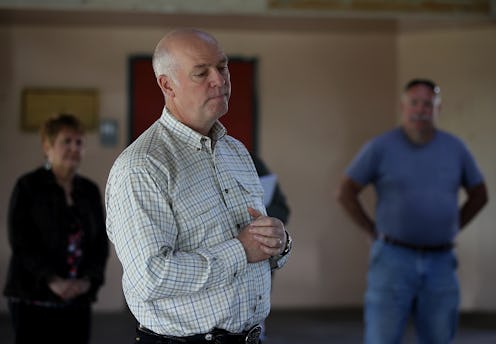News
Greg Gianforte Is What Happens When A President Calls Journalists "The Enemy"

The Republican candidate in Montana's special election for a House seat has been charged with misdemeanor assault for allegedly body-slamming a journalist. If the year were not 2017, that sentence might read like dystopian fiction. But the year is 2017, and audio recording plus several eyewitness accounts all seem to corroborate that, on Wednesday, GOP candidate Greg Gianforte did physically attack Ben Jacobs, a political reporter for The Guardian. (Gianforte's spokesperson insisted that Jacobs initiated physical contact first.)
While this news is shocking, the events of the past 23 months make it significantly less so. President Trump's unprecedented nastiness toward the media was a feature of his rallies, his Twitter feed, his policy proposals, his campaign team. A logical conclusion, then, is that Gianforte's alleged attack is simply the manifestation of Trump's hostility toward the press.
That hostility turned to violence on Wednesday. Gianforte, a tech billionaire who ran and lost in the 2016 race to become Montana governor, was speaking with Jacobs at his campaign headquarters. After Jacobs questioned him about the American Health Care Act, Gianforte grew upset and allegedly grabbed Jacobs, threw him to the floor, possibly punched him, and broke his glasses. Audio recording of the altercation seems to corroborate this version of events, as do multiple statements taken by other eyewitnesses, including Fox News reporters.
According to a statement by Shane Scanlon, Gianforte's spokesman, the GOP candidate disagrees with that version of events.
“After asking Jacobs to lower the recorder, Jacobs declined,” he said. “Greg then attempted to grab the phone that was pushed in his face. Jacobs grabbed Greg’s wrist and spun away from Greg, pushing them both to the ground.”
That neither the audio recording nor the eyewitnesses appear to back up this retelling apparently does not matter. Endorsed by Trump, Gianforte seems to have taken a page from his party leader's playbook. Saying something that can easily be disproved is no longer a problem — it's an asset to help one escape problems, at least temporarily.
But, of course, there's another lesson Gianforte's learned from the boss. At Trump's campaign rallies, he kept reporters in a "pen," a fenced-in area that could reasonably be described as a cage, and would then encourage his fans to jeer at them. It's eerily similar to what Trump did during the campaign, when he name-checked individual reporters for derision, from the famous (Megyn Kelly and Chuck Todd) to the completely unknown (Ben Schreckinger, a junior politics reporter at Politico who had been covering the Trump campaign for just three months).
And then, there's his Twitter feed. Anyone who crossed Trump was fair game for his tweet blasts, and no one entity received more regular scorn than the "FAKE NEWS" mainstream media:
Perhaps more concerning is that Trump has actually spoken openly about his desire to amend libel laws in order to sue publications. He first announced this plan in February 2016, but it has recently resurfaced as a goal of his presidential administration. Trump's chief of staff, Reince Priebus, spoke just a few weeks ago about how the administration has "looked at" changing libel laws — which help protect the freedom of the press — before going to say, "I think that newspapers and news agencies need to be more responsible with how they report the news."
This accusation might have more credible if Priebus worked for a man who held himself to rigorous standards of fairness and honesty. But for Trump to accuse anyone of misleading or deceptive portrayals of reality is a definitive example of the pot calling the kettle black. Some have characterized Trump's propensity to lie as "pathological."
And the administration rarely gives actual examples of the oft-cited "fake news!" Instead, it seems that Trump blasts the media for negative reporting, regardless of whether it's true.
Gianforte's alleged body slam is not the first act of violence demonstrated toward a reporter, either. During the 2016 primary, Trump's then-campaign manager, Corey Lewandowski, allegedly physically manhandled a reporter, Michelle Fields. The controversy led to several resignations at Breitbart, the news outlet Fields worked for at the time, when the pro-Trump website sided with the billionaire candidate over its own employee. Video eventually released by the local police chapter showing Lewandowski grabbing Fields vindicated her. Despite pictures of a bruised arm and evidence proving she had been grabbed by Lewandowski, Fields never received an apology. Trump stood by Lewandowski through the scandal, though he did let him go several months later, citing the need to go a "different route."
As leader of the country and the Republican Party, President Trump sets a tone. The tone during his campaign was that the press were the enemy and treating them as such would not only be allowed, but welcomed. That hasn't changed since he's taken office. Gianforte took the president's disdain and disgust for the media to another level of inappropriate. There is never an excuse for physically assaulting a reporter for doing their job.
But the difference between what Gianforte did, and how Trump has treated a free press, is one of degree, not variety. When a president encourages his supporters to taunt and humiliate individual reporters, when he threatens to change libel laws to quiet the media, when he weaponizes his Twitter feed to go after news outlets and journalists, and when he stands by a campaign manager accused of assaulting a female reporter, a certain message emerges.
Trump called the press the "enemy of the American people." It was only a matter of time before others started taking him literally. After all, how is a "true" American supposed to approach a traitorous enemy? It's a question one hopes Trump takes more seriously from here on out.